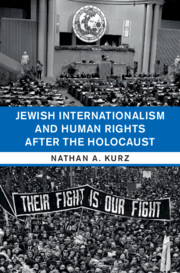Book contents
- Jewish Internationalism and Human Rights after the Holocaust
- Human Rights in History
- Jewish Internationalism and Human Rights after the Holocaust
- Copyright page
- Dedication
- Contents
- Acknowledgments
- Abbreviations
- Dramatis Personae
- Introduction
- 1 “Individual Rights Were Not Enough for True Freedom”
- 2 Who Will Tame the Will to Defy Humanity?
- 3 The Consequences of 1948
- 4 Exit from North Africa
- 5 From Antisemitism to “Zionism Is Racism”
- 6 The Inadequacy of Madison Avenue Methods
- 7 “Good Words Have Become the Servants of Evil Masters”
- Conclusion
- Notes
- Bibliography
- Index
Conclusion
Published online by Cambridge University Press: 05 November 2020
- Jewish Internationalism and Human Rights after the Holocaust
- Human Rights in History
- Jewish Internationalism and Human Rights after the Holocaust
- Copyright page
- Dedication
- Contents
- Acknowledgments
- Abbreviations
- Dramatis Personae
- Introduction
- 1 “Individual Rights Were Not Enough for True Freedom”
- 2 Who Will Tame the Will to Defy Humanity?
- 3 The Consequences of 1948
- 4 Exit from North Africa
- 5 From Antisemitism to “Zionism Is Racism”
- 6 The Inadequacy of Madison Avenue Methods
- 7 “Good Words Have Become the Servants of Evil Masters”
- Conclusion
- Notes
- Bibliography
- Index
Summary
As part of a seminar convened by the AJC in the early 1970s, Rita Hauser offered a functional explanation for the gulf that had emerged between Jewish internationalism and human rights. “The dream of protection of Jews, so long the victims of abuse, by universal schemes, seems ill-fated,” she wrote. “Jews thrive in free nations; in others, they can only hope for escape to the homeland in Israel. The Zionists of 1945 were probably right.”1 Hauser, an American Jewish lawyer who served as the US representative to the UN Commission on Human Rights in the years it started to become deeply antagonistic to Israel, had a particular viewpoint. She was claiming that the affinity between Jewish internationalism and human rights had been based only on enlightened self-interest. As long as Jews were a minority dispersed throughout the world, she was arguing, they had every reason to back international human rights. Now that Jews were a disappearing minority, increasingly concentrated in the twin pillars of postwar Jewish life, the United States and Israel, there was no longer a compelling rationale for the equation of Jewish with human rights.
- Type
- Chapter
- Information
- Jewish Internationalism and Human Rights after the Holocaust , pp. 186 - 193Publisher: Cambridge University PressPrint publication year: 2020

